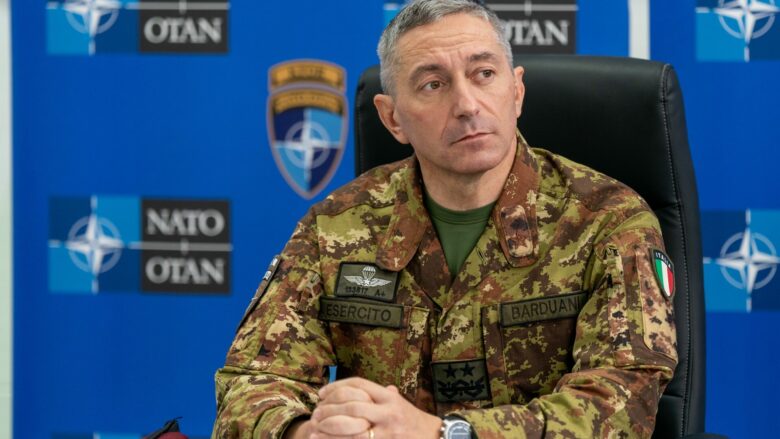KFOR Commander, Major General Enrico Barduani, has stated that while the security situation in Kosovo is generally calm, it remains fragile due to unresolved political issues. Barduani emphasized NATO’s commitment to maintaining security and stability in the country, highlighting that the European Union-mediated dialogue is the only path towards lasting peace.
Fragile Security Environment and KFOR’s Role
“Despite the significant improvements we have seen in the last two decades, the situation remains sensitive due to the unresolved political problems. The tensions of 2023 led to an increase in KFOR’s presence by over 1,000 additional troops, one of the largest reinforcements this decade,” Barduani said in an interview with RTV Dukagjini.
Speaking about the visit of the EU’s High Representative, Kaja Kallas, to northern Kosovo, Barduani noted that despite the calm, there is a risk of sudden outbreaks of violence. He cited the attack on KFOR troops in Zvecan in May 2023 and the incident in the Ibër-Lepenc canal in November 2024 as evidence of the situation’s fragility. He added that KFOR is taking preventive measures to maintain calm and cooperation with all local communities.
“We are prepared and present with full capacities to fulfill our UN mandate. But stability in the region does not depend solely on KFOR – it depends on the political will for dialogue and cooperation,” he expressed.
US Involvement and Stance on Serbia
Asked about the possibility of a reduction in the American presence in the region, Barduani assured that the U.S. commitment to NATO and KFOR remains strong, mentioning Washington’s long-term contribution to the mission.
He also addressed Serbia’s stance and the lack of investigations into the 2023 attacks on KFOR troops. “The violence in Zvecan and Banjska was unacceptable. NATO has demanded that those responsible be brought to justice, but unfortunately, we have not seen sufficient progress in this regard.”
Regarding reports that 70 percent of the Serbian army is deployed near the border with Kosovo, he stated that the Armed Forces of Serbia are obligated to report any activity near the administrative line to KFOR, and to date, there have been no violations of procedures.
Banjska Incident and KSF’s Role
When asked about the terrorist attack led by Milan Radoičić in Banjska and its possible objective, Barduani did not provide details on the investigations, emphasizing that they are the responsibility of law enforcement authorities in Kosovo.
Regarding the participation of the Kosovo Security Force (FSK) in operations, he confirmed that the FSK can enter the north only with the prior consent of the KFOR commander – a commitment that NATO considers important for maintaining stability. “Our cooperation with the Police and FSK is good. The FSK has participated in joint exercises under its original mandate and has shown high professionalism,” he said.
Political Gridlock and Call for Dialogue
Commenting on the political gridlock in Kosovo and the delay in forming the government, Barduani emphasized that although NATO does not interfere in internal political matters, the political situation does affect the security environment.
“We encourage all parties to move forward in a way that reflects the interests of all communities living in Kosovo. The only solution for long-term peace remains dialogue,” Barduani concluded.







